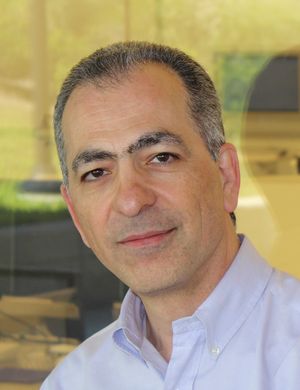Khalil Najafi: Difference between revisions
m (Text replacement - "\}\} \[\[Image:(.*)\|.*thumb\]\]" to " |Image=$1 }}") |
No edit summary |
||
| Line 1: | Line 1: | ||
{{Biography | {{Biography | ||
|Image=Najafi PHOTO USE THIS.jpg | |Image=Najafi PHOTO USE THIS.jpg | ||
|Associated organizations=University of Michigan | |||
|Fields of study=[[MEMS]] | |||
}} | }} | ||
The visionary contributions of Khalil Najafi have helped advance the development of [[MEMS|micro-electro-mechanical systems (MEMS)]] technology synonymous with the sensors ingrained in today’s automotive, mobile, and biomedical applications. In 1994 he developed the first micromachined vibrating ring gyroscope featuring a high-aspect ratio electroplated nickel process integrated with CMOS electronics. This device was commercialized and became the highest performing automotive gyroscope. His work showing that sensitive multi-axis accelerometers could be fabricated in a system-in-package approach helped the introduction of accelerometers in mobile phones. He also demonstrated wafer-level vacuum encapsulation with a biocompatible glass-silicon package that could remain airtight for 20 years, which paved the way for implantable wireless biomedical devices. | The visionary contributions of Khalil Najafi have helped advance the development of [[MEMS|micro-electro-mechanical systems (MEMS)]] technology synonymous with the sensors ingrained in today’s automotive, mobile, and biomedical applications. In 1994 he developed the first micromachined vibrating ring gyroscope featuring a high-aspect ratio electroplated nickel process integrated with CMOS electronics. This device was commercialized and became the highest performing automotive gyroscope. His work showing that sensitive multi-axis accelerometers could be fabricated in a system-in-package approach helped the introduction of accelerometers in mobile phones. He also demonstrated wafer-level vacuum encapsulation with a biocompatible glass-silicon package that could remain airtight for 20 years, which paved the way for implantable wireless biomedical devices. | ||
Latest revision as of 17:02, 2 February 2016
Biography
The visionary contributions of Khalil Najafi have helped advance the development of micro-electro-mechanical systems (MEMS) technology synonymous with the sensors ingrained in today’s automotive, mobile, and biomedical applications. In 1994 he developed the first micromachined vibrating ring gyroscope featuring a high-aspect ratio electroplated nickel process integrated with CMOS electronics. This device was commercialized and became the highest performing automotive gyroscope. His work showing that sensitive multi-axis accelerometers could be fabricated in a system-in-package approach helped the introduction of accelerometers in mobile phones. He also demonstrated wafer-level vacuum encapsulation with a biocompatible glass-silicon package that could remain airtight for 20 years, which paved the way for implantable wireless biomedical devices.
An IEEE Fellow, Dr. Najafi is the Schlumberger Professor of Engineering and Chair of Electrical and Computer Engineering at the University of Michigan, Ann Arbor, MI, USA.
